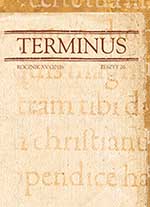Plus ratio quam vis. Od mimochodem rzuconej sentencji do dewizy uniwersyteckiej
Plus ratio quam vis, or, the career of a sentence
Author(s): Anna Maria WasylSubject(s): Literary Texts
Published by: Wydawnictwo Uniwersytetu Jagiellońskiego
Keywords: Maximianus; plus ratio quam vis; university mottos; sententiae; Jagiellonian University; Kraków Academy; Karol Estreicher Jr.; Roman love elegy; Cornelius Gallus; literary culture in the age of Th eoderic the Great
Summary/Abstract: Although the Jagiellonian University was established as early as in 1364, its widelyrecognized motto was chosen and inscribed on the portico leading from the Assembly Hall to Copernicus Hall much later, only in the mid-twentieth century. In 1952, Professor Karol Estreicher Jr., the head of the University Museum, came across a sentence which he considered “worth being the Jagiellonian University’s motto” (the inscription was eventually carved on the portico in 1964). Apparently, all that Estreicher knew was that the phrase plus ratio quam vis was “a part of a Latin proverb.” He had no idea whatsoever of its author or the original context in which it had been used. Frequently (still too frequently, in truth) the phrase is quoted as coined by Cornelius Gallus, usually labeled, after Ovid, the first of the elegiac poets of Rome. The mistake is justifiable, at least to some extent, as the actual author of the poetic work in which the hemistich appears was for quite a long time mistaken for Cornelius Gallus. After Pomponius Gauricus’s edition of Cornelii Galli Fragmenta (Venice, 1501 die. XII. Ianuarii, which actually means 1502, as the date is indicated more veneto), the elegiac oeuvre by Maximianus, an author active in sixth-century Italy, was, so to speak, redefined as Gallus’s. Until the late eighteenth century the false attribution continued to be repeated by many other editors, who in fact very willingly published collections of the Roman love poets, Catullus, Tibullus, Propertius, and ‘Gallus’. It is to some point ironic that in the modern era Maximianus was so easily deprived of the ‘copyright’ to his own poetry, considering that earlier, in the Middle Ages, he was an author (relatively) well-known (under his real name) and even read in and recommended for schools. This aspect brings us back to our main topic here, i.e. the choice of Maximianus’s phrase as the motto of the Jagiellonian University, one of the oldest universities in the world. Karol Estreicher himself was presumably not aware of this but Maximianus was indeed studied in the Kraków Academy in mid-fifteenth century (as two manuscripts, BJ 1954 and 2141, preserved in the Jagiellonian Library, clearly indicate). He was studied for his vivid descriptions of old age (for which he was celebrated among many medieval commentators and theorists of teaching, who apparently were not at all embarrassed by the fact that their students, when reading Maximianus, might have also read a laus Mentulae) and for his sententiositas. What is more, the Jagiellonian Library possesses a considerable collection of incunabula and old prints containing Maximianus’s (or ‘Gallus’s’) work. So paradoxically, Karol Estreicher could not have chosen better. The motto of UJ is related to its history, in the sense that it is taken from an author whose work was on the reading list in the Academy in the later Middle Ages, it is concise, intelligent, significant, and ‘decent,’ even though it was original
Journal: TERMINUS
- Issue Year: 15/2013
- Issue No: 1 (26)
- Page Range: 15-34
- Page Count: 20
- Language: Polish

